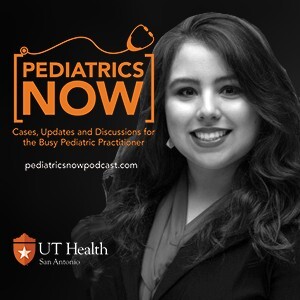
Friday May 10, 2024
Child Neglect: Signs, Symptoms and What to Do
Child Neglect: Signs, Symptoms and What to Do
Link for MOC Credit:
https://cmetracker.net/UTHSCSA/Publisher?page=pubOpen#/getCertificate/10095849
In this powerful episode, Pediatrics Now Host Holly Wayment brings us a grand rounds talk by the University of Texas Health Science Center's Dr. Mary Ann Alvarez-Griffis, a child abuse fellow. She sheds light on the critical issue of child neglect. Providing an in-depth analysis based on National Child Abuse and Neglect Data System (NCANDS) statistics, she challenges common misconceptions and highlights potential outcomes for children exposed to neglect.
The talk emphasizes the recurrent nature of neglect, its equal severity as physical abuse, and its long-term consequences on a child's peer relations, academic performance, and problem-solving skills. Special attention is given to children with special needs, who account for a significant percentage of child maltreatment fatalities.
Drawing from her rich experience in pediatric care and community education, Dr. Alvarez-Griffis unravels the devastating impact of neglect on children's growth, cognitive development, social skills and emotional wellbeing. Notably, she underscores poverty and insufficient social support as major risk factors, presenting a comprehensive exploration of neglect statistics.
The episode underscores the urgency of recognizing signs of physical neglect, fostering open, non-judgmental communication with caregivers, and effectively addressing potential issues. With detailed case studies, the discussion centers on the importance of thorough investigations and interventions. The significance of growth charts in identifying risk factors and possible neglect signs are also discussed.
Dr. Alvarez-Griffiths shines a spotlight on the severe consequences of medical neglect and emphasizes the need for a consistent medical regimen for children dealing with chronic conditions. The implications of neglectful behaviors, such as untimely medical care and poor home management of serious injuries, are explored in depth.
In conclusion, healthcare providers are urged to proactively leverage detailed examinations, thorough documentation, and persistent patient education to prevent child neglect and support affected families. This episode serves as a comprehensive guide, unpacking the intricate realities of child neglect, and proffering effective strategies for prevention and intervention.
Dr. Alvarez Griffis has dual undergraduate degrees of Pre-medical Biology and Political Science from University of Texas-Pan American (now UTRGV). She attended medical school at William Carey College of Osteopathic Medicine prior to completing her Pediatric Residency at UT Health Science Center in San Antonio where she continued to peruse a fellowship in Child Abuse Pediatrics. During fellowship training Dr. Alvarez Griffis has provided community education regarding child maltreatment to various audiences from pediatric residents to SAPD. She recently participated in updating the AAP Point of Care Quick Reference section on Physical Abuse and Neglect. She is a member of the Child Abuse and Neglect Committee of the Texas Pediatric Society and is also a member of the Council on Child Abuse and Neglect. Her fellows research project focuses on the importance of obtaining head circumferences in infants to prevent missed abusive head trauma.
Financial Disclosures: Mary Ann Alvarez Griffis, DO has no financial relationships with ineligible companies to disclose.
The Pediatric Grand Rounds Planning Committee (Deepak Kamat MD, PhD, Daniel Ranch, MD and Elizabeth Hanson, MD) has no financial relationships with ineligible companies to disclose. Planning Committee member Steven Seidner, MD has disclosed he receives funding from Draeger Medical for the Clinical Study to Evaluate the Safety and Effectiveness of the Infinity Acute Care System Workstation Neonatal Care Babylog VN500 Device in High-Frequency Oscillatory Ventilation (HFOV) Mode in Extremely Low Birth Weight (ELBW) Neonates for
No comments yet. Be the first to say something!